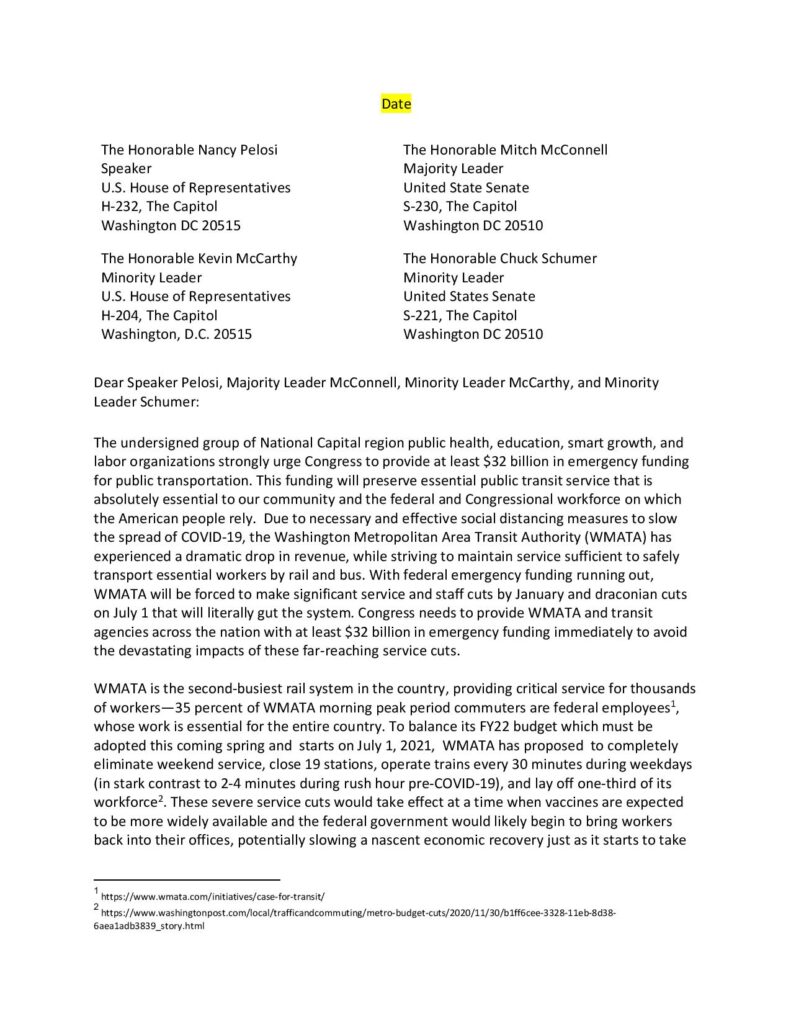January 23, 2021
Alexandria City Council
301 King Street
Alexandria, VA 22314
RE: Support for Accessory Dwelling Units in Alexandria
Dear Mayor Wilson and Members of City Council:
Please accept these comments on behalf of the Coalition for Smarter Growth (CSG), the leading organization in the DC region advocating for walkable, inclusive, transit-oriented communities. CSG appreciates the City of Alexandria’s efforts to develop an accessory dwelling unit (ADU) policy and writes to convey our full support of the proposal. CSG has become a leading expert on ADUs through our work in DC and our just-released DC ADU homeowners manual.
Accessory dwelling units can offer less expensive housing options than renting or buying a single-family home because of their smaller size. They are great for an aging parent you are caring for, offer a home for your recent college graduate, or a young professional just starting their career. ADUs can also offer a stream of income for homeowners, including lower-income homeowners and retirees on fixed incomes.
CSG is enthusiastic about the strong provisions being proposed that will help make the City’s program a success, such as allowing ADUs citywide, and enhance their feasibility and affordability by not requiring off street parking in our transit-rich, walkable city, and not requiring owner-occupancy on site.
An owner-occupancy requirement lacks flexibility for the homeowner and may limit one’s ability to build an ADU. It can make it difficult for homeowners to finance an ADU. This may serve to exacerbate income and racial inequities by limiting the ability of homeowners to construct ADUs to those with sufficient equity in their homes. An owner-occupancy requirement would also be limiting to people who must move on short notice, such as military and diplomatic families, who often choose to rent out their primary residence. We also note that single-family homes today are already frequently rented out by owners who are not living on site. The owner-occupancy requirement would be a barrier to constructing ADUs and undermine the goal of increasing the supply of ADUs in the city.
We encourage the city to include requirements for regular review, reporting, and recommendations by city staff on refinements to the program. This could include creating an affordability program for low-income renters or buyers, assessing size limitations and setbacks and their impact, whether or not the program has exacerbated or improved racial and income inequalities, and recommendations to address any other barriers towards creating new housing through ADUs.
We understand that some Alexandria residents who are opposed to ADUs and previously opposed the Seminary Road safety project have attacked CSG and our supporters as being outsiders. CSG is a longstanding, 24-year-old regional organization advocating for transit, safe streets, transit-oriented development, and affordable housing throughout the DMV and were honored with the Council of Governments’ (COG) Regional Partnership Award in 2017. Our staff live in Northern Virginia, Maryland, and DC and work with local advocates in each jurisdiction. We sent emails about the ADU program to our Alexandria members and subscribers encouraging them to participate in the ADU study process and to contact the City Council, and we remind our supporters that the emails on Alexandria issues are focused on Alexandria residents. At the same time, local elected officials meeting at COG have agreed that housing, like transportation, is a regional issue, requiring shared effort by every jurisdiction.
CSG believes the proposed ADU policy is a bold step forward in establishing a strong program that will help provide more housing options in Alexandria. Thank you for your time and consideration.
Sincerely,
Stewart Schwartz
Executive Director
Sonya Breehey
Northern Virginia Advocacy Manager




